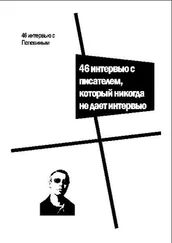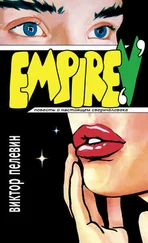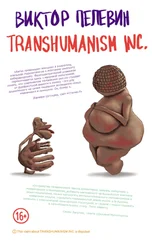Виктор Пелевин - Babylon
Здесь есть возможность читать онлайн «Виктор Пелевин - Babylon» весь текст электронной книги совершенно бесплатно (целиком полную версию без сокращений). В некоторых случаях можно слушать аудио, скачать через торрент в формате fb2 и присутствует краткое содержание. Жанр: Современная проза, на английском языке. Описание произведения, (предисловие) а так же отзывы посетителей доступны на портале библиотеки ЛибКат.
- Название:Babylon
- Автор:
- Жанр:
- Год:неизвестен
- ISBN:нет данных
- Рейтинг книги:5 / 5. Голосов: 1
-
Избранное:Добавить в избранное
- Отзывы:
-
Ваша оценка:
- 100
- 1
- 2
- 3
- 4
- 5
Babylon: краткое содержание, описание и аннотация
Предлагаем к чтению аннотацию, описание, краткое содержание или предисловие (зависит от того, что написал сам автор книги «Babylon»). Если вы не нашли необходимую информацию о книге — напишите в комментариях, мы постараемся отыскать её.
Babylon — читать онлайн бесплатно полную книгу (весь текст) целиком
Ниже представлен текст книги, разбитый по страницам. Система сохранения места последней прочитанной страницы, позволяет с удобством читать онлайн бесплатно книгу «Babylon», без необходимости каждый раз заново искать на чём Вы остановились. Поставьте закладку, и сможете в любой момент перейти на страницу, на которой закончили чтение.
Интервал:
Закладка:
‘All in good time,’ said Khanin, giving him a sweet smile.
Even without any secret handbooks Tatarsky was already beginning to find his bearings in the commercial relations of the age of virtual business. As he was quick to realise from observing the behaviour of his colleagues at work, the basis of these relations was so-called ‘black PR’, or as Khanin pronounced it in full: ‘black public relations’. The first time Tatarsky heard the words the bard of the Literary Institute was resurrected briefly in his soul, intoning in sombre tones:
‘Black public relations, uniting all nations…’ But there wasn’t actually any real romantic feeling behind this abbreviation, and it was entirely devoid of the baggage of negative connotations ascribed to it by those who use the phrase ‘black PR’ to mean an attack mounted via the mass media.
It was actually quite the opposite - advertising, like other forms of human activity in the vast, cold expanses of Russia, was inextricably intertwined with the ‘black cash flow’, which in practical terms meant two things. Firstly, journalists were quite willing to deceive their newspapers and magazines by extracting black cash from anyone who more or less naturally fell within their field of attention - and it wasn’t just restaurant-owners who wanted to be compared with Maxim’s who had to pay, but writers who wanted to be compared with Marquez, which meant that the boundary between literary and restaurant criticism grew ever finer and more arbitrary. Secondly, copywriters took pleasure in deceiving their agencies by finding a client through them and then concluding an unwritten deal with him behind their bosses’ backs. After he’d taken a good look around, Tatarsky took a cautious first step on to this fruitful ground, where he met with immediate success: he managed to sell his slightly modified project for Finlandia vodka (the new slogan was: ‘Reincarnation Now!’).
Usually he dealt with lowly cogs in the PR machinery, but this time he was summoned to the owner of the firm that intended to take on the dealership for Finlandia, who was a dour and serious-minded youth. Having read several times through the two pages Tatarsky had brought, he chuckled, thought for a moment, rang his secretary and asked her to prepare the paperwork. Half an hour later a stunned Tatarsky emerged on to the street, carrying in his inside pocket an envelope containing two and a half thousand dollars and a contract for the full and unconditional transfer of all rights to the young man’s company.
For those changed times this was an absolutely fantastic haul.
But a couple of months later Tatarsky accidentally discovered an incredibly insulting little detail: it turned out Finlandia’s future distributor hadn’t paid up because he’d decided to use his text in his advertising, but because he was afraid Tatarsky might sell it to Absolut or Smirnoff dealers. Tatarsky even started to write a sonnet dedicated to this event, but after a couple of minutes discarded it as non-functional. In general, it was hard to believe that not so very long ago he had been wont to spend so much time searching for meaningless rhymes that had long since been abandoned by the poetry of the market democracies. It seemed simply inconceivable that only a few short years ago life had been so gentle and undemanding that he could waste entire kilowatts of mental energy in dead-end circuits of his brain that never paid back the investment.
Tatarsky suspected that black PR was a more widespread and significant phenomenon than just a means of survival for certain protein-based life-forms in the era of the mass media; but he couldn’t connect up his heterogeneous suspicions concerning the true nature of the phenomenon to form a clear and unified understanding. There was something missing.
‘Public relations are people’s relations with each other,’ he jotted down in confused fashion in his notebook.
People want to earn money in order to gain freedom, or at least a breathing space from their interminable suffering. And we copywriters manipulate reality in front of people’s eyes so that freedom comes to be symbolised by an iron, or a sanitary towel with wings, or lemonade. That’s what they pay us for. We pawn this stuff off on them from the screen, and then they pawn it off on each other, and on us who write the stuff, and it’s like radioactive contamination, when it makes no difference any longer who exploded the bomb. Everyone tries to show everyone else that they’ve already achieved freedom, and as a result, while we pretend to socialise and be friendly, all we really do is keep pawning each other off with all sorts of jackets, mobile phones and cars. It’s a closed circle. And this closed circle is called black PR.
Tatarsky became so absorbed in his thoughts on the nature of this phenomenon that he wasn’t in the least surprised when one day Khanin stopped him in the corridor, grabbed hold of one of his buttons and said: ‘I see you know all there is to know about black PR.’
‘Almost,’ Tatarsky answered automatically, because he’d just been thinking about the topic. "There’s just some central element that’s still missing.’
‘I’ll tell you what it is. What’s missing is the understanding that black public relations only exist in theory. What happens in real life is grey PR.’
‘That’s interesting,’ said Tatarsky enthusiastically, ‘very interesting! Quite astounding! But what does it mean in practical terms?’
‘In practical terms it means you have to shell out.’
Tatarsky started. The fog of thoughts clouding his mind was dispersed in an instant to be replaced by a terrifying clarity.
‘How d’you mean?’ he asked feebly.
Khanin took him by the arm and led him along the corridor.
‘Did you take delivery of two grand from Finlandia?’ he asked.
‘Yes,’ Tatarsky replied uncertainly.
Khanin bent the middle and fourth fingers of his hand over slightly - far enough to suggest that he was about to shift to the hand-gestures characteristic of New Russian thugs, but not too far, so the situation still seemed to be peaceful.
‘Now remember this,’ he said quietly. ‘As long as you work here, you work to me. There’s no other way to figure it and make sense. So the figures say one grand of greenbacks is mine. Or were you thinking of setting up on your own?’
‘I, I… I’d be delighted…’ Tatarsky stammered in a state of shock. ‘That is, of course I don’t want to… That is, I do. I wanted to split it; I just didn’t know how to bring up the subject.’
‘No need to be shy about it. Someone might get the wrong idea. You know what? Why don’t you come round to my place this evening. We can have a drink and a talk. And you can drop in the mazuma while you’re at it.’
Khanin lived in a large, newly refurbished flat, in which Tatarsky was astonished by the patterned oak doors with gold locks - what astonished him about them was the fact that the wood had already cracked and the gaps in the panels had been filled in a slapdash fashion with mastic. Khanin was already drunk when he greeted his guest. He was in an excellent mood - when Tatarsky held out the envelope to him from the doorway, Khanin knitted his brows and waved it aside, as though offended at such a brusque businesslike entrance, but at the extreme extent of the gesture he lifted the envelope out of Tatarsky’s fingers and immediately tucked it away somewhere.
‘Let’s go,’ he said, ‘Liza’s cooked something.’
Liza proved to be a tall woman with a face red from some kind of cosmetic scrubbing. She fed Tatarsky stuffed cabbage leaves, which he had hated ever since he was a small child. In order to overcome his revulsion he drank a lot of vodka, and by the time the dessert arrived he had almost reached Khanin’s state of intoxication, which meant socialising went a lot smoother.
Читать дальшеИнтервал:
Закладка:
Похожие книги на «Babylon»
Представляем Вашему вниманию похожие книги на «Babylon» списком для выбора. Мы отобрали схожую по названию и смыслу литературу в надежде предоставить читателям больше вариантов отыскать новые, интересные, ещё непрочитанные произведения.
Обсуждение, отзывы о книге «Babylon» и просто собственные мнения читателей. Оставьте ваши комментарии, напишите, что Вы думаете о произведении, его смысле или главных героях. Укажите что конкретно понравилось, а что нет, и почему Вы так считаете.






